All products and services are For Research Use Only and CANNOT be used in the treatment or diagnosis of disease.
Creative Biolabs has developed various anti-MUC16 CART products and services for global customers. Our technical teams are pleased to receive any inquiries from customers regarding CART development, please do not hesitate to contact us.
MUC16 (Mucin 16), is the highest molecular weight glycoprotein in the mucin family, which plays a crucial role in maintaining cellular homeostasis and epithelium protection. MUC16 structure includes an extensive extracellular N-terminal region, a single transmembrane domain, a cytoplasmic tail, and a tandem repeat. MUC16 is expressed in many types of cancer cells and is associated with the proliferation and metastasis of many cancer cells. Several researches have shown that MUC16 is expressed in 80% EOC, and its extracellular region is cleaved and released in the peripheral blood, becoming a popular tumor indicator, known as CA125. Therefore, MUC16 has been investigated as an ideal antigenic target for CAR molecules in many cancer types.
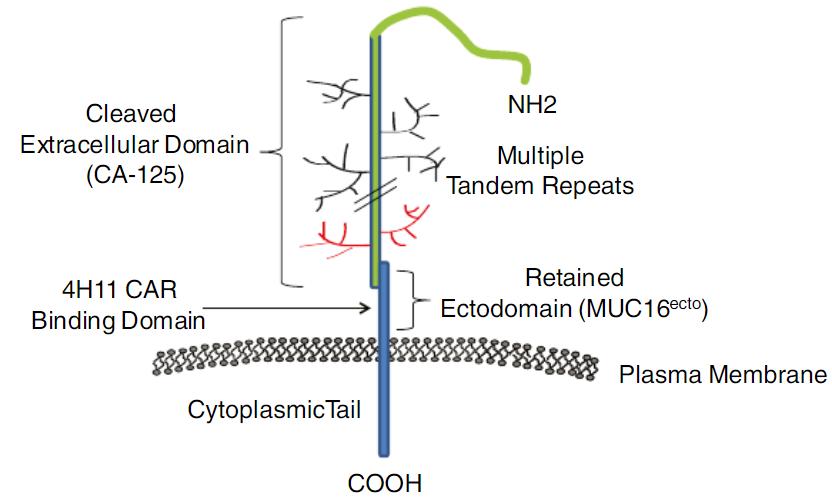 Fig.1 Schematic representation of MUC16 structure.1
Fig.1 Schematic representation of MUC16 structure.1
Ovarian cancer
Endometrial cancer
Fallopian tube cancer
Lung cancer
Anti-MUC166 CAR-T Expression Test
CAR expression validation is a basic test in CAR-T development. There are several methods used in CAR expression tests, while flow cytometry is the most often used method. At Creative Biolabs, we have developed a variety of CAR detection reagents to be used in FACS applications, covering extensive hot targets to support clients' CAR-T therapy development. Meanwhile, we also specialize in providing comprehensive CAR expression tests to speed up your CART project.
Anti-MUC166 CAR-T Cell Proliferation Assay
To characterize the CART cell proliferation capacity when co-cultured with tumor target cells, Creative Biolabs offers a convenient suite of assay services to evaluate the proliferation capacity of CART cells, ranging from the preparation of tumor cells to the collation of subsequent assay results.
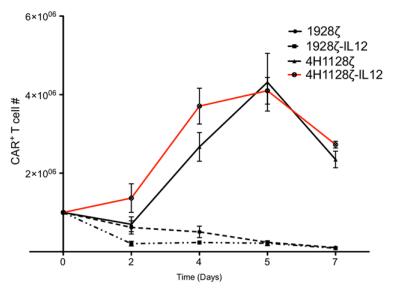 Fig.2 CART cell proliferation testing in Anti-MUC166 CAR T cells (4H1128ζ) co-cultured with ID8-Muc16ecto target cells.2
Fig.2 CART cell proliferation testing in Anti-MUC166 CAR T cells (4H1128ζ) co-cultured with ID8-Muc16ecto target cells.2
Anti-MUC166 CAR-T Cytokine Release Test
There are several cytokines secretion during CART interacting with cancer cells, such as IL-2, TNF-a, and IFN-r. Creative Biolabs provides various cytokine release test approaches to aid in clients' CART development, including single cytokine test by ELISA, and multiplex cytokine test by bead-based multiplex method.
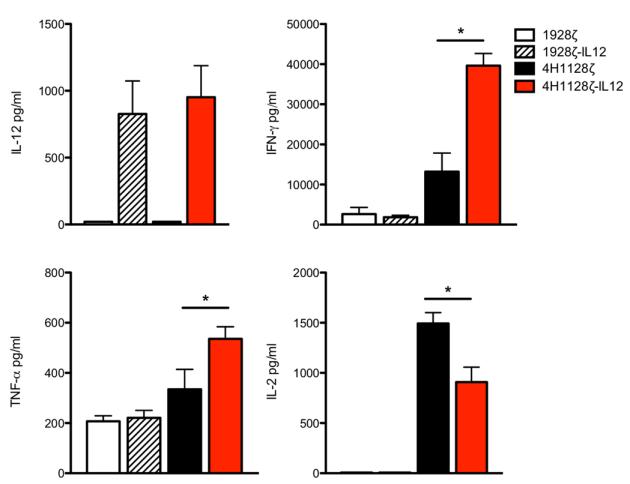 Fig.3 In vitro cytokine detection in Muc16 CART cells (4H1128ζ) co-cultured with ID8-Muc16ecto target cells.2
Fig.3 In vitro cytokine detection in Muc16 CART cells (4H1128ζ) co-cultured with ID8-Muc16ecto target cells.2
Anti-MUC166 CAR-T In Vitro Cytotoxicity Assay
Muc16-specific CAR T cells showed increased cytotoxicity against ID8-Muc16ecto target cells at the specific indicated E:T ratio. At Creative Biolabs, we offer custom-optimized cytotoxicity assay services to meet global customers' needs.
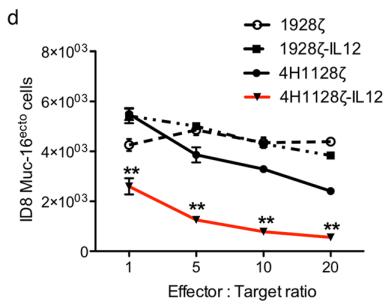 Fig.4 In vitro cytotoxicity assay of Anti-MUC166 CAR-T (4H1128ζ) against ID8-Muc16ecto target cells at the indicated E:T ratio.2
Fig.4 In vitro cytotoxicity assay of Anti-MUC166 CAR-T (4H1128ζ) against ID8-Muc16ecto target cells at the indicated E:T ratio.2
Efficacy Test of Anti-MUC166 CAR-T
For CART in vivo efficacy testing, the appropriate animal models and experimental design are very important for the smooth progress of the project. With our years of experience in CART development, we provide a variety of experimental models and in vivo efficacy solutions for customers to choose from.
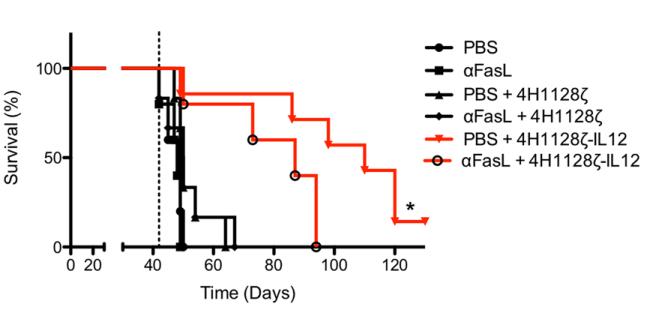 Fig.5 In vivo potency evaluation of MUC16 CAR-T cells against ID8-Muc16ecto bearing-tumor with the treatment of αFasL.2
Fig.5 In vivo potency evaluation of MUC16 CAR-T cells against ID8-Muc16ecto bearing-tumor with the treatment of αFasL.2
Toxicity Evaluation Anti-MUC166 CAR-T
In addition, Creative Biolabs is dedicated to offering a variety of toxicological evaluation services to speed up clients' CART development, including on-target and off-target toxicity studies, tumorigenicity studies, etc.
References
 Loading...
Loading...
| CAT | Product Name | Target Species | Antibody Clone | Antibody Host | Receptor Construction | Vector Type | Targeting Cell Type | CAR Vector Type | Inquiry & Datasheet |
| XS-0123-ZP488 | Anti-MUC16 (CB-P04) h(scFv-CD3ε) TRuC, pCDTRC1 | Mouse | CB-P04 | Human | scFv-CD3ε | Lentiviral vector | T cell | ||
| XS-0323-ZP749 | Anti-MUC16 (XP749 scFv-CD28TM-CD79β) CBCR(CAR-B), pCDCAR1 | Human | XP749 | Mouse | scFv-CD28TM-CD79β | Lentiviral vector | T cell | CAR-B Vector | |
| XS-0323-LX3858 | TRAC-MUC16 (X3XT60) h(CD28-41BB-CD3ζ) replaced CAR, pcDNA Vector | Human | X3XT60 | Humanized | Homology arm-EF1a-scFv-CD28-41BB-CD3ζ-Homology arm | Nonviral | T cell | CAR-T | |
| XS-0323-LX3859 | TRAC-MUC16 (X3XT61) h(CD28-41BB-CD3ζ) replaced CAR, pcDNA Vector | Human | X3XT61 | Humanized | Homology arm-EF1a-scFv-CD28-41BB-CD3ζ-Homology arm | Nonviral | T cell | CAR-T | |
| XS-0323-LX3860 | TRAC-MUC16 (X3XT62) h(CD28-41BB-CD3ζ) replaced CAR, pcDNA Vector | Human | X3XT62 | Humanized | Homology arm-EF1a-scFv-CD28-41BB-CD3ζ-Homology arm | Nonviral | T cell | CAR-T | |
| XS-0323-LX3861 | TRAC-MUC16 (X3XT63) h(CD28-41BB-CD3ζ) replaced CAR, pcDNA Vector | Human | X3XT63 | Mouse | Homology arm-EF1a-scFv-CD28-41BB-CD3ζ-Homology arm | Nonviral | T cell | CAR-T | |
| XS-0323-LX3862 | TRAC-MUC16 (X3XT64) h(CD28-41BB-CD3ζ) replaced CAR, pcDNA Vector | Human | X3XT64 | Mouse | Homology arm-EF1a-scFv-CD28-41BB-CD3ζ-Homology arm | Nonviral | T cell | CAR-T | |
| XS-0323-LX3863 | TRAC-MUC16 (X3XT65) h(CD28-41BB-CD3ζ) replaced CAR, pcDNA Vector | Human | X3XT65 | Mouse | Homology arm-EF1a-scFv-CD28-41BB-CD3ζ-Homology arm | Nonviral | T cell | CAR-T | |
| XS-0323-LX4100 | TRAC-MUC16 (X3XT60) h(CD28-OX40-CD3ζ) replaced CAR, pcDNA Vector | Human | X3XT60 | Humanized | Homology arm-EF1a-scFv-CD28-OX40-CD3ζ-Homology arm | Nonviral | T cell | CAR-T | |
| XS-0323-LX4101 | TRAC-MUC16 (X3XT61) h(CD28-OX40-CD3ζ) replaced CAR, pcDNA Vector | Human | X3XT61 | Humanized | Homology arm-EF1a-scFv-CD28-OX40-CD3ζ-Homology arm | Nonviral | T cell | CAR-T | |
| XS-0323-LX4102 | TRAC-MUC16 (X3XT62) h(CD28-OX40-CD3ζ) replaced CAR, pcDNA Vector | Human | X3XT62 | Humanized | Homology arm-EF1a-scFv-CD28-OX40-CD3ζ-Homology arm | Nonviral | T cell | CAR-T | |
| XS-0323-LX4103 | TRAC-MUC16 (X3XT63) h(CD28-OX40-CD3ζ) replaced CAR, pcDNA Vector | Human | X3XT63 | Mouse | Homology arm-EF1a-scFv-CD28-OX40-CD3ζ-Homology arm | Nonviral | T cell | CAR-T | |
| XS-0323-LX4104 | TRAC-MUC16 (X3XT64) h(CD28-OX40-CD3ζ) replaced CAR, pcDNA Vector | Human | X3XT64 | Mouse | Homology arm-EF1a-scFv-CD28-OX40-CD3ζ-Homology arm | Nonviral | T cell | CAR-T | |
| XS-0323-LX4105 | TRAC-MUC16 (X3XT65) h(CD28-OX40-CD3ζ) replaced CAR, pcDNA Vector | Human | X3XT65 | Mouse | Homology arm-EF1a-scFv-CD28-OX40-CD3ζ-Homology arm | Nonviral | T cell | CAR-T | |
| XS-0323-LX4343 | TRAC-MUC16 (X3XT61) h(ICOS-4-1BB-CD3ζ) replaced CAR, pcDNA Vector | Human | X3XT61 | Humanized | Homology arm-EF1a-scFv-ICOS-41BB-CD3ζ-Homology arm | Nonviral | T cell | CAR-T | |
| XS-0323-LX4344 | TRAC-MUC16 (X3XT62) h(ICOS-4-1BB-CD3ζ) replaced CAR, pcDNA Vector | Human | X3XT62 | Humanized | Homology arm-EF1a-scFv-ICOS-41BB-CD3ζ-Homology arm | Nonviral | T cell | CAR-T | |
| XS-0323-LX4345 | TRAC-MUC16 (X3XT63) h(ICOS-4-1BB-CD3ζ) replaced CAR, pcDNA Vector | Human | X3XT63 | Mouse | Homology arm-EF1a-scFv-ICOS-41BB-CD3ζ-Homology arm | Nonviral | T cell | CAR-T | |
| XS-0323-LX4346 | TRAC-MUC16 (X3XT64) h(ICOS-4-1BB-CD3ζ) replaced CAR, pcDNA Vector | Human | X3XT64 | Mouse | Homology arm-EF1a-scFv-ICOS-41BB-CD3ζ-Homology arm | Nonviral | T cell | CAR-T | |
| XS-0323-LX4347 | TRAC-MUC16 (X3XT65) h(ICOS-4-1BB-CD3ζ) replaced CAR, pcDNA Vector | Human | X3XT65 | Mouse | Homology arm-EF1a-scFv-ICOS-41BB-CD3ζ-Homology arm | Nonviral | T cell | CAR-T | |
| XS-0823-LX80 | Anti-hMUC16 (11) ICD(CD28-OX40-CD3ζ) CAR-MA, pAd5f35 Vector | Human | 11 | Adenoviral vectors | |||||
| XS-0923-LX94 | Anti-hMUC16 (CD28-41BB-CD3ζ) CAR-duplex CTLA4 pCDCAR1 Vector | Human | X9X-63 | scFv-CD28-41BB-CD3ζ-duplex CTLA4 | Lentiviral vector | T cell | CAR-T |
 NEWSLETTER
NEWSLETTER
The latest newsletter to introduce the latest breaking information, our site updates, field and other scientific news, important events, and insights from industry leaders
LEARN MORE NEWSLETTER NEW SOLUTION
NEW SOLUTION
CellRapeutics™ In Vivo Cell Engineering: One-stop in vivo T/B/NK cell and macrophage engineering services covering vectors construction to function verification.
LEARN MORE SOLUTION NOVEL TECHNOLOGY
NOVEL TECHNOLOGY
Silence™ CAR-T Cell: A novel platform to enhance CAR-T cell immunotherapy by combining RNAi technology to suppress genes that may impede CAR functionality.
LEARN MORE NOVEL TECHNOLOGY NEW SOLUTION
NEW SOLUTION
Canine CAR-T Therapy Development: From early target discovery, CAR design and construction, cell culture, and transfection, to in vitro and in vivo function validation.
LEARN MORE SOLUTION